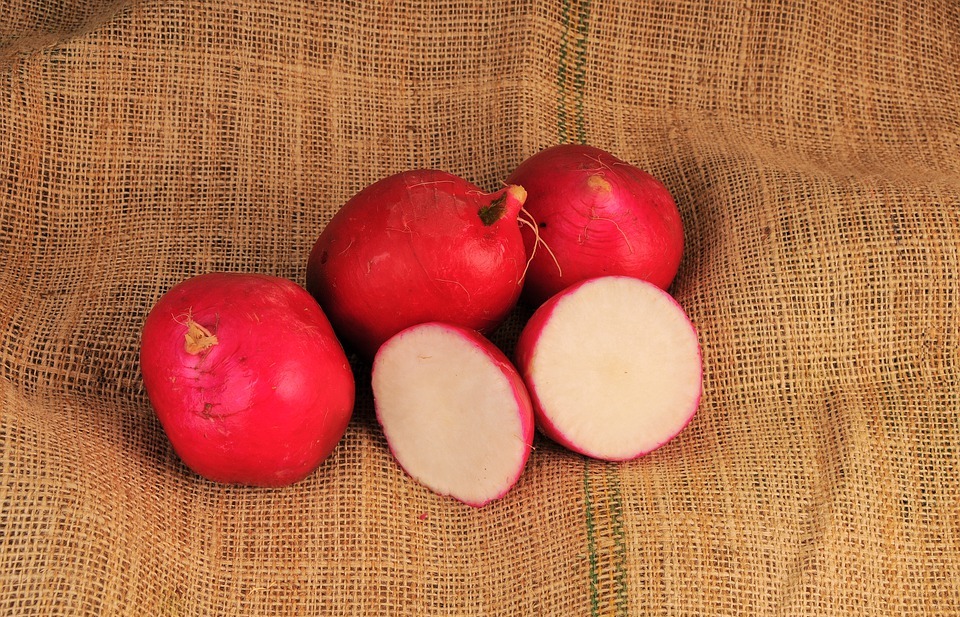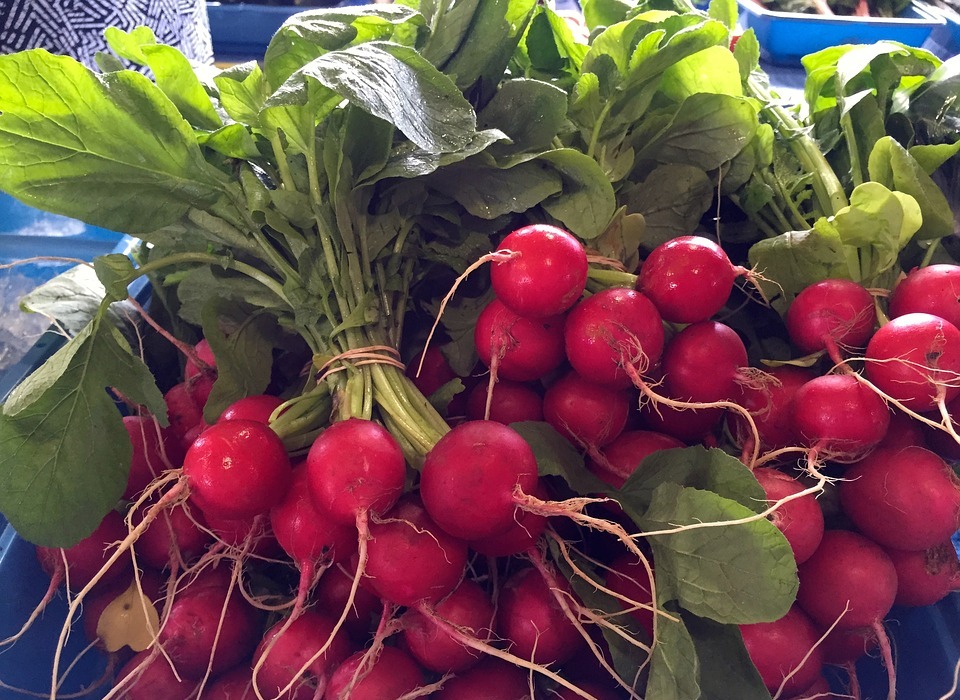This in-depth guide will explore the suitability of radishes as part of a rabbit's diet. We will analyze the nutritional value of radishes, evaluate potential risks, and provide a comprehensive roadmap for maintaining a healthy and balanced diet for your furry friend.
Part 1: The Nutritional Profile of Radishes

1.1 A Treasure Trove of Vitamins and Minerals
Radishes are a rich source of various essential nutrients, including:
- Vitamin C: A potent antioxidant that strengthens the immune system and helps protect against cell damage.
- Vitamin B6: Crucial for metabolism, brain function, and the production of neurotransmitters.
- Potassium: An electrolyte that plays a vital role in regulating blood pressure, muscle function, and nerve impulses.
- Fiber: Essential for maintaining digestive health, promoting regular bowel movements, and supporting gut microbiota balance.
- Calcium: A vital mineral for strong bones, teeth, and overall skeletal health.
- Folate: Essential for cell growth and development, especially during pregnancy.
- Antioxidants: Radishes contain various antioxidants, such as anthocyanins, which protect against cell damage and may reduce the risk of chronic diseases.
1.2 Low in Calories and Fat: A Weight-Management Consideration
Radishes are naturally low in calories and fat, making them a suitable option for rabbits needing to manage their weight. This low-calorie density can help maintain a healthy weight without compromising nutritional intake.
Part 2: The Debate: Are Radishes Safe for Rabbits?

2.1 The General Consensus: Moderation is Key
While radishes are not inherently toxic to rabbits, they should be consumed in moderation due to their potential drawbacks, especially related to their sugar content and fibre.
2.2 Potential Risks and Considerations
- High Sugar Content: Radishes, particularly the larger varieties, contain a higher sugar content than some other vegetables, which can lead to digestive problems and dental issues in rabbits if consumed excessively.
- Gastrointestinal Upset: The high fibre content, especially in the greens, can cause diarrhoea, gas, and discomfort in some rabbits, particularly when introduced suddenly or consumed in large quantities. This is especially true for young rabbits or those with sensitive digestive systems.
- Pesticide Residues: Conventionally grown radishes may contain pesticide residues, which can pose health risks to rabbits. Choosing organic varieties is highly recommended to minimise this risk.
- Nitrates: Radishes contain nitrates, which can be converted to nitrites in the body. High nitrate levels can be problematic, especially for young rabbits, as they can interfere with oxygen transport in the blood.
Part 3: Introducing Radishes to Your Rabbit's Diet
3.1 Start Slowly and Observe
Introduce radishes gradually, starting with a small piece and observing your rabbit's reaction carefully. Monitor for any signs of digestive upset, such as diarrhoea, gas, lethargy, or loss of appetite.
3.2 Offer as a Treat, Not a Staple
Radishes should be considered a treat, not a staple food. Offer them occasionally, perhaps a couple of times per week, and in moderate amounts.
3.3 Wash Thoroughly
Before feeding radishes, ensure they are washed thoroughly to remove any dirt, pesticides, or residues.
3.4 Consider Variety and Balance
While radishes can be a tasty treat, it's important to ensure a diverse and balanced diet for your rabbit. Encourage a variety of fresh vegetables and leafy greens, alongside their primary source of nutrition: hay.
Part 4: A Deep Dive into the Importance of a Balanced Rabbit Diet
4.1 Hay: The Cornerstone of a Healthy Rabbit Diet
Hay should constitute the majority of a rabbit's diet, providing essential fibre, promoting healthy digestion, and preventing dental problems. Choose high-quality, Timothy hay, as it is lower in calories and higher in fibre than alfalfa hay.
4.2 Fresh Vegetables: A Daily Dose of Nutrients
Offer a variety of fresh, leafy green vegetables daily to provide essential vitamins, minerals, and antioxidants. Some excellent choices include:
- Spinach
- Kale
- Collard Greens
- Dandelion Greens
- Parsley
- Cilantro
- Basil
- Bell Peppers
- Broccoli Florets
- Cucumber
4.3 Fruits: Treat with Caution
Fruits can be offered as occasional treats but should be limited due to their higher sugar content. Choose fruits like apples (without the seeds), berries, and bananas in small amounts.
4.4 Water: Essential for Hydration and Digestion
Ensure your rabbit has constant access to fresh, clean water. Proper hydration is vital for digestion, nutrient absorption, and overall health.
Part 5: Navigating Potential Digestive Issues
5.1 Gradual Introduction is Key
When introducing new foods, especially those like radishes that are potentially high in fibre or sugar, do so gradually and observe closely for any signs of digestive upset.
5.2 Limit Treats and Focus on Essentials
Restrict the number of treats, including radishes, to ensure your rabbit receives the primary nutrients from their hay and fresh vegetables.
5.3 Consult a Veterinarian for Concerns
If you notice any signs of digestive upset, such as diarrhoea, gas, lethargy, or loss of appetite, consult your veterinarian immediately. Early intervention can often prevent more serious health issues.
Part 6: Understanding Your Rabbit's Behavioural Clues
6.1 Observe for Digestive Distress
Pay attention to any changes in your rabbit's behaviour, especially related to digestion. Look for signs like:
- Diarrhoea
- Loss of appetite
- Lethargy
- Gas or bloating
- Straining to defecate
- Weight loss
6.2 Dental Problems: A Common Issue
Rabbits' teeth continuously grow, so they need to chew constantly to wear them down. A lack of fibre in their diet can lead to overgrown teeth, causing pain, difficulty eating, and potential health complications.
Part 7: Choosing the Right Radishes for Your Rabbit
7.1 Organic is Best
Whenever possible, opt for organic radishes to minimize the risk of pesticide residues.
7.2 Choose Fresh and Crisp
Select fresh, crisp radishes that are free from damage, blemishes, or signs of decay.
7.3 Avoid Sprouts
Radishes with sprouts may have a higher sugar content and may not be as palatable to your rabbit.
7.4 Offer a Variety of Radishes
Experiment with different varieties of radishes, such as round radishes, long radishes, or even daikon radishes, to see which ones your rabbit enjoys the most.
Part 8: Addressing Common Questions
8.1 Can Rabbits Eat Radish Greens?
While radish greens are edible, they should be offered in moderation due to their higher fibre content, which can cause digestive issues. Consider offering them in small amounts and observe your rabbit's reaction carefully.
8.2 Can Baby Rabbits Eat Radishes?
Baby rabbits should not eat radishes as their digestive systems are still developing. They require a diet primarily consisting of hay and milk from their mother.
8.3 Can I Give My Rabbit Radish Seeds?
It is not recommended to give your rabbit radish seeds. They can be a choking hazard and may contain harmful compounds.
8.4 How Often Can I Give My Rabbit Radishes?
Radishes should be offered as an occasional treat, no more than a few times a week, and always in moderate amounts.
8.5 Can I Cook Radishes for My Rabbit?
It is best to feed your rabbit raw radishes. Cooking can destroy some of the nutrients and make them less palatable.
8.6 What Other Vegetables Can My Rabbit Eat?
Besides radishes, there are many other vegetables that are safe and beneficial for rabbits, including:
- Bell peppers
- Broccoli florets
- Carrots (in moderation)
- Celery
- Cucumber
- Lettuce (some varieties)
- Spinach
- Kale
- Collard greens
- Parsley
- Cilantro
- Basil
8.7 Are There Any Radishes to Avoid?
While most radishes are safe for rabbits in moderation, avoid offering them red radishes, as they contain higher levels of nitrates.
Conclusion: Prioritise a Healthy and Balanced Diet
While radishes can be a tasty treat for rabbits, it is crucial to offer them in moderation and with caution, considering their potential drawbacks related to sugar content and fibre. A balanced diet consisting primarily of hay, fresh vegetables, and occasional treats is essential for your rabbit's overall health and well-being. Always consult with your veterinarian for any concerns or questions regarding your rabbit's diet.
Everyone is watching
-

Do Rabbits Lay Eggs? (The Surprising Truth)
OTHER TYPES OF PETSThis article will unravel the common misconception that rabbits lay eggs, exploring the fascinating world of r...
-

Can Rabbits Eat Grapes? A Guide to Safe Rabbit Treats
OTHER TYPES OF PETSThis comprehensive guide will explore the safety and suitability of grapes for rabbits, providing detailed inf...
-

What's a Group of Rabbits Called? (A Comprehensive Guide)
OTHER TYPES OF PETSThis article delves into the fascinating world of rabbits, exploring the various terms used to describe a grou...
-

Predators That Hunt Rabbits: A Guide to Natural Enemies
OTHER TYPES OF PETSI've always been fascinated by the circle of life, that delicate dance between predator and prey. Growing up ...
-

Are Rabbits Nocturnal Animals?
OTHER TYPES OF PETSThe question of whether rabbits are nocturnal animals is a fascinating one, with a surprisingly complex answer...
